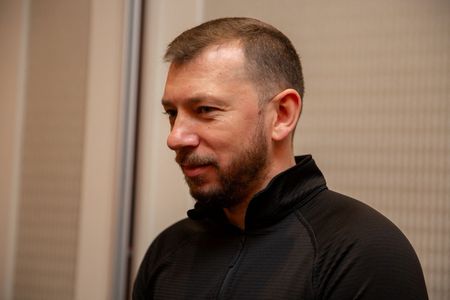 1
1 1
1
By Dan Peleschuk
KYIV (Reuters) – Ukraine’s crackdown on corruption has raised eyebrows in recent months by going after respected former technocrats who helped repair the country after the political upheaval of 2014.
Chief anti-corruption prosecutor Oleksandr Klymenko is aware of public pressure to put more prominent names or current officials behind bars.
But he says the rule of law must prevail as Ukraine strives to meet European Union demands to stamp out high-level graft.
“For us, the deciding factor is the supremacy of the law,” he told Reuters in an interview in his office in Kyiv.
“We want to show results both for society and for Ukraine’s partners, since we understand they’re following our work,” added Klymenko, who was appointed last July.
Brussels has made fighting corruption a precondition for Kyiv to join the 27-member EU. Despite progress in recent years, Ukraine ranks 116th out of 180 countries in Transparency International’s Corruption Perceptions Index.
Anti-graft authorities say they are working hard to put that right. Earlier this month the National Anti-Corruption Bureau of Ukraine (NABU), whose cases Klymenko’s office prosecutes, announced it would hire 20 more investigators.
Last week, a court ordered Odesa Mayor Henadii Trukhanov into pre-trial detention on embezzlement charges after a petition by Klymenko’s prosecutors.
The case was launched in 2018 but had since bounced from court to court and faced numerous procedural delays. Trukhanov denies wrongdoing and has been released on bail.
Others targeted by Kyiv’s anti-graft bodies include a former deputy defence minister and former head of the State Property Fund.
TOUGH CASES
But Klymenko’s team and NABU have angered parts of the business and reform communities by investigating ex-technocrats who led reforms nearly a decade ago after an uprising against a pro-Russian leader paved the way for Kyiv’s European ambitions.
Authorities suspect Andriy Kobolyev, former head of state oil and gas giant Naftogaz, of illegally awarding himself a $10 million bonus in 2018 and Andriy Pivovarsky, a former infrastructure minister, of abusing office when deregulating port trade in 2015.
Both men, who had successful private sector careers before joining government, deny wrongdoing and say the evidence against them is shoddy.
In interviews with Reuters, both said investigators with little knowledge of matters like corporate governance had misconstrued what were pro-business practices.
Critics, including supporters of Kyiv’s anti-corruption drive, have said the probes could deter would-be reformers at a crucial time for Ukraine as it tries to move away from Russia’s sphere of influence and into the EU fold, all while battling a Russian invasion.
“No one is above the law, but you need to understand what signals you are sending,” said Max Nefyodov, former first deputy economy minister who served in post-2014 governments.
Klymenko said his team remains objective and pursues probes – many involving sophisticated schemes – they believe are the most promising. He added that cases had piled up and prosecutors must ensure statutes of limitation do not expire.
Allowing for due process, Klymenko said, was critical to cementing the rule of law in Ukraine.
“This is the only civilized way to resolve all of these disagreements within society in a rule-abiding state,” Klymenko said.
(Reporting by Dan Peleschuk; Editing by Angus MacSwan)